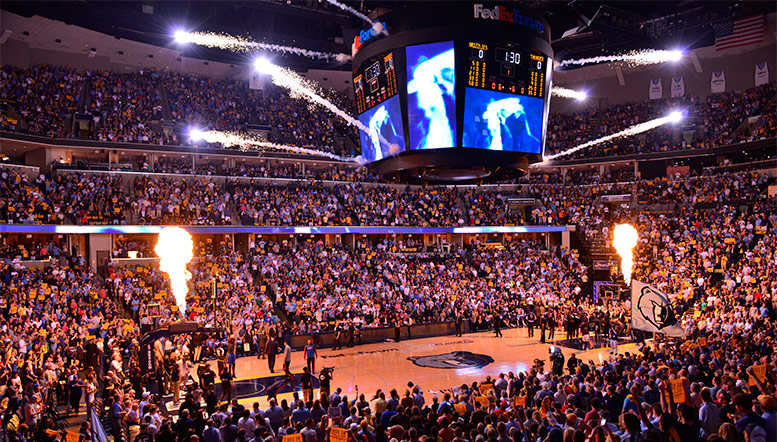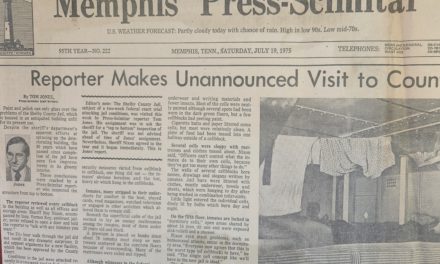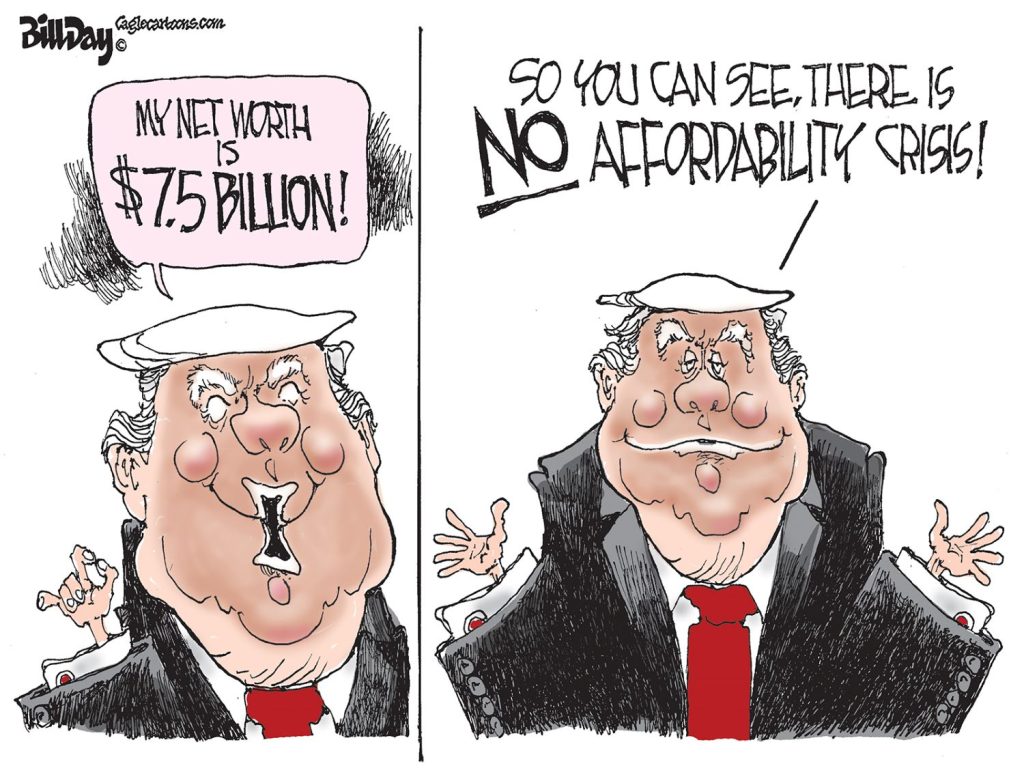Graceland officials say that their new proposed 6,000-seat arena will not pull events and concerts away from FedExForum, but that only hints at the biggest question of all: does the new arena threaten Memphis and Shelby County’s non-compete agreement with the Grizzlies-operated arena?
It is in neither local government’s advantage if the Graceland arena becomes a competitor to the FedExForum. We learned that lesson when the renegade board of the Mid-South Coliseum went head-to-head with The Pyramid after it opened in 1991. It drove down the rental rates and drove up city and county government’s operating subsidy to the new arena to around $1.5 million a year.
The good news is that the Grizzlies pay the operating deficit for FedExForum and you can credit that to the non-compete agreement. As a result, Memphis and Shelby County taxpayers were not required to pay what was estimated at the time to be a deficit of approximately $4-5 million a year.
At the time, Nashville’s metro government was paying the operating deficit for its National Hockey League team, and today, the NHL’s Predators receive about $8 million per year in subsidies and incentives to operate the city-owned Bridgestone Arena. The Grizzlies get nothing.
Do No Harm
In other words, anything that would threaten the non-compete agreement could open up new negotiations with the Grizzlies and if that takes place, it’s hard not to think that the team would be in the driver’s seat. After all, when the operating agreement for the FedExForum was signed, the team was homeless, and although most sports pundits said that a small market like Memphis could never get the team to pay the arena’s operating deficit, local government officials were able to negotiate an agreement that required them to do precisely that.
The noncompete agreement gives the FedExForum priority rights to concerts and events in Memphis, because it was in the public interest for the team to maximize its revenues. In the long term, it was one of the best deals city and county taxpayers have ever had.
The noncompete agreement also said that local government would not help build another arena that would be compete with FedExForum.
All of us love Graceland and want desperately for it to be the kind of success that can be the incentive to sparking new economic development in Whitehaven, a part of the city whose future we should all be fighting for. We just hope that the powers-that-be are careful that nothing being done in the way of public incentives for the Graceland arena puts the existing agreement at risk or gives the Grizzlies an opening to renegotiate the contract.
Locked and Loaded
By the way, in addition to the Grizzlies being required to pay the operating deficit, the pundits also predicted that the Grizzlies would only stay in Memphis for a few years and they would relocate as soon as they could. And yet, the contract with the Grizzlies locked the team to play in Memphis for 17-20 years and if the team leaves before the arena’s bonds are paid off in roughly 15 years, the team will be pay the balance of the bond debt.
The following is my City Journal column in Memphis magazine from June 1, 2015:
In 2001 it seemed improbable that the Grizzlies would ever come to Memphis.
In return for the team to pay operating losses, city and county governments agreed to the now infamous non-compete clause that gave the Grizzlies priority in booking concerts and other performances in Memphis.
I t’s difficult, taking into account the shapeshifting that now transforms the Memphis persona for about half of each year, to remember how improbable it looked in 2001 that the Grizzlies would ever come here.
The Clock Winds Down
There was the push by Heidi Shafer, self-described stay-at-home mom and now Shelby County commissioner, to force a referendum on the $250 million bond issue to pay for Pyramid upgrades so the team could play there for three years and pay for construction of a new arena.
There was the lawsuit by local attorney Duncan Ragsdale — who famously described the litigation as almost as exciting as Vietnam — charging that the new arena was being built to benefit private business, and the ruling by Chancellor Walter Evans agreeing with him, until it was reversed by a scolding Tennessee Court of Appeals.
There were the narrowest of votes by Shelby County commissioners to keep the dream alive. Eventually, a scientific poll showing that a majority of the public supported the project and a University of Memphis report concluding that the team created new economic activity were the winning shots as the clock was running down.
But all of that was merely public theater compared to the weeks-long drama taking place in the boardroom of Storage USA. There, contentious negotiations were playing out between local government officials and the attorney for Grizzlies owner Michael Heisley. Although Heisley was anxious to move his team from Vancouver, Canada, he was doing his best to wring out everything he wanted by pitting Memphis against Charlotte in the sweepstakes for his team.
Getting The “W”
Although it was clear that the Grizzlies could be a salve for the deep wounds to the civic ego caused by repeated National Football League rebuffs, negotiations were anything but a slam dunk. On three occasions, negotiators walked away from the table, and government officials packed up their briefcases and called it a loss.
Often overlooked today is that, ultimately, it was city and county governments that got the “W,” defying predictions that a small market city could ever get the unprecedented concessions it wanted from an NBA team: an agreement for it to pay all operating deficits for its new arena and to agree to stay for about 20 years (or to pay the rough equivalent of the balance on the bonds if the team broke the contract).
On the first day of negotiations, it looked like a deal was not to be. Each side laid out its positions, but after city and county negotiators outlined their “nonnegotiable deal breakers,” the Grizzlies representatives picked up their files, left the building, and flew out of the city. Eventually, with an intervention by Dean Jernigan, then president/CEO of Storage USA, the negotiators convened again and agreed to move through the list of easy-to-solve negotiation items.
After weeks of removing item after item from the checklist, it finally got down to the big contested issues again. City and county government refused to budge and the team insisted that it would never agree. This time, government negotiators packed up their files and went back to their offices.
The Big Pay Day
Jernigan again mediated the conflict and got both sides back to the table, and eventually, despite all odds to the contrary, the Grizzlies accepted the two significant deal breakers of local government. In return for the team to pay operating losses, city and county governments agreed to the now infamous non-compete clause that gave the Grizzlies priority in booking concerts and other performances in Memphis.
At the time, the arena’s operating losses were estimated to be more than $5 million a year, and that’s about what Nashville was paying to keep its National Hockey League team. Local governments’ position was influenced by the lesson it learned when both The Pyramid and Mid-South Coliseum were kept open. Promoters, not taxpayers, benefited from lower rental rates as the facilities battled each other for business. Keeping three arenas with operating deficits looked even bleaker if there was no agreement for the Grizzlies to pay for arena operations: $2 million a year at The Pyramid, $1 million at the Coliseum, and $5 million at FedExForum.
To cap that off, no city had ever negotiated the long-term commitment that city and county were demanding, but Memphis got that too, dashing widespread rumors that Heisley planned to “flip” the team after being here only a few years.
After 14 years, every fan has a memory of their favorite wins by the Grizzlies, but negotiators believe the biggest wins were the ones earned before the team ever took the court.
**
Join us at the Smart City Memphis Facebook page for daily articles, reports, and commentaries relevant to Memphis.





Once again, Tom, you have a way of taking complex issues and sorting them out so that lay people like myself can understand. Thanks.
If this happens the FedEx Forum will eventually become another Pyramid. The city can not allow that to happen.
FedEx Forum is already dark too many nights each year as many big shows do not include Memphis on their tour schedule. While a 6000 seat venue at Graceland is not huge, it is bound to draw events that might have gone downtown.
What I fear is that the Graceland area is already becoming a tacky tourist zone in a bad part of the city — sort of like an Elvis-themed Branson, Missouri. The surrounding areas remain terrible.
As always, we must compare Memphis to Nashville. The Bridgestone Arena there is consistently in the top arena venues of the world in terms of events held and tickets sold. It remains so vital because downtown Nashville has become a world class tourism and convention destination. Bridgestone thrives in spite of the various Gaylord Opryland venues – the Grand Ole Opry House, Ryman Auditorium, Wildhorse Saloon, as well as the Ascend Ampitheatre and the Nashville Municipal Auditorium all of which compete directly with Bridgestone Arena. Nashville is a city that can support large multiple event venues. Memphis simply cannot.
Why MUST we compare Memphis to Nashville? There are many other cities in this country, many with more similarities to Memphis than Memphis has to Nashville. And saying something like the Wildhorse Saloon competes with an 18,000 seat professional sports arena is a bit of a stretch, no?
All venues in any city compete for audiences of varying sizes. In some ways the Orpheum is like the Wildhorse in Nashville.. It’s the sum of the parts for arenas and theaters that make a difference. I agree that we are always compared to Nashville which has moved up to the major leagues compared to here.
The only people who would go to Graceland theatre would be the typical Elvis wackos. Overwhelmingly middle aged white women. I don’t think the Fedex Forum should be concerned too much.
Is there any one that city government will not give away taxes to? Now it’s a tourist attraction.
How about giving taxpayer some equity in the project?
Anonymous: It’s easy for you to say Graceland shouldn’t be concerned, but my concern is for taxpayers who are putting money into their project and could lose millions if the Grizzlies deal is screwed up.
A 6000 seat arena would no more compete with the FedExForum than the Landers Center does, which just takes the lesser shows that don’t want to pay for the seats that they could not fill downtown.
However, a theatre/arena that size would absolutely CRUSH any further redevelopment of the Mid-South Coliseum as a concert/sports venue. If this goes forward, you might as well break out the bulldozers on Southern Avenue.
Steve: We’re thinking more of the ice shows, kids shows, and family shows that are at FedExForum are part of its bread and butter. Those need to stay there.
There is absolutely no reason not to compare and contrast Tennessee’s two largest cities. But we need to be realistic because Memphis is akin to Birmingham, Little Rock, Louisville, Jackson MS. Cities like Nashville, Charlotte, Raleigh/Durham and Austin are in a different league.
The primary challenge here is not about venues, but about markets. We simply need more people who can afford tickets.
case in point:
New Years Eve Bridgestone Center: Jimmy Buffett and the Coral Reefers
New Years Eve FedEx Forum: Dark.
Not an arena issue. A market issue.
Memphis is a poor city. Most people just don’t have the disposable income for concerts, sports and special events at arenas. That’s why so many of the top shows don’t even include Memphis in their schedule.
You mean to tell me there are not enough people in AR, MS, and western TN to purchase tickets to various events? Or is it incompetence or a simple case of not trying to recruit events? Or is it the non-compete clause that is sandbagging the ability to get events?
Yes, going back for years, the concert market in Memphis has been soft because the number of potential ticket buyers is small. Too few people with disposable incomes and with salaries that can afford tickets.
We don’t see much difference in the number of concerts that the Pyramid was able to bring here and the number brought by Grizzlies. The non-compete is a non-factor since there is no other locally-owned venue.
I think the Whitehaven arena would compete more with the Landers Center in DeSoto County, getting smaller shows that went there as well as high school graduations.
If it makes Whitehaven more prosperous, then it’s good for the FedExForum as well because more money for buying event tickets will be situated in Shelby County.
I wouldn’t worry too much about FedExForum. The Grizzlies are smart business people and they’ll figure a way to make a profit.
I would hope so. It would be nice to have an actual market study rather than everyone involved expressing their opinions.
It would be great to have some facts. The Grizzlies have said that the ice shows, family shows, and smaller shows that are bread and butter for it. Those aren’t going to Landers generally but if they go to Whitehaven, it is a net loss for Memphis if it opens up noncompete agreement.